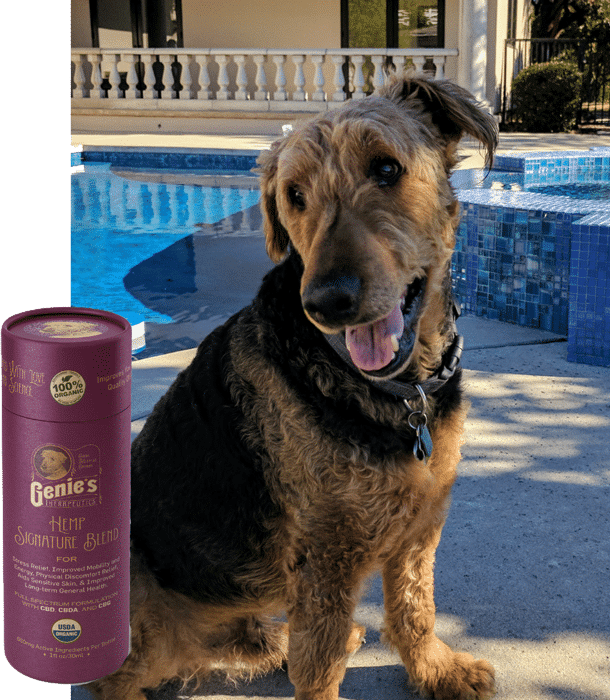Sniffing Out Airedale Terrier Health Problems: A Vital Guide

Welcome, Genie’s reader, to the world of Airedale Terriers.
These dogs, often dubbed the “King of Terriers,” are as regal as they are rambunctious. With their wiry coats and keen eyes, they’re a sight to behold. But beneath that majestic exterior, they’re just like any other dog – prone to a few health hiccups here and there. Airedale Terriers are especially close to our heart as Genie’s Therapeutics was founded based on our Airedale Terrier family, Genie’s story.

Now, don’t let that worry you.
Every breed has its quirks, and Airedales are no exception. They’re known to occasionally wrestle with issues like hip dysplasia, skin allergies, and even anxiety. But fear not, for every problem, there’s a solution. Or in this case, a supplement, a diet change, or a new grooming routine.
We’re here to guide you through the labyrinth of Airedale health issues.
We’ll delve into the nitty-gritty of what causes these problems, how to spot them, and most importantly, how to tackle them. We’ll explore everything from hip pain to hot spots, from joint issues to jitters. And we’ll do it all with a dash of humor, a sprinkle of wit, and a whole lot of love for our four-legged friends.
This guide is for everyone.
So, whether you’re a seasoned Airedale owner or a newbie, a pet store owner, or a blogger, this guide is for you.
We’ll help you navigate the sometimes choppy waters of Airedale health, armed with knowledge, understanding, and a few handy tips. So, buckle up, grab a cup of tea (or a doggy treat), and let’s dive into the world of Airedale Terrier health problems.
Understanding Airedale Terriers: An Overview
The Airedale Terrier is a classic blend of stature and spirit. Known as the largest of terriers, their origins trace back to 19th-century England, bred to hunt otters and rats.
Nowadays, they are often spotted leaping at their beloved squeaky toy or strutting through the park with the typical terrier confidence.
With their lush, dense coats and loyal hearts, they stand out in any crowd. Not just for their looks, of course, but for their lively demeanor. An Airedale Terrier is no wallflower; they’re often the life of the canine party.
But here’s the thing about Airedales: they’re more than just bark and bite. These dogs boast impressive intelligence and a sharp wit. They are often quick to learn and love a good challenge. Their curious nature can sometimes be a double-edged sword for unprepared owners.
However, owning an Airedale isn’t all smooth sailing. They can be headstrong, a trait that might test your patience. Yet, their affectionate nature and bond with their families make every moment worthwhile. Understanding this balance between their need for activity and affectionate side is key to a happy pup.
Airedale Terriers also have specific health quirks. Like any other breed, knowing these quirks helps in providing proactive care. Being prepared means recognizing symptoms early and taking the right steps. Let’s dive a bit deeper into their personalities and the importance of keeping them healthy.
Airedale Terrier Personality and Temperament
Airedales are known for their bold, confident personalities. These dogs bring enthusiasm to everything they do, from playful antics to learning new tricks. Their lively nature makes them excellent companions, especially for those who lead active lives.
But don’t let their exuberance fool you; they have a softer side. Airedales are incredibly loyal and protective of their families. This loyalty sometimes leads to being a tad territorial or possessive, but with proper training and socialization, they adjust well.
Training an Airedale requires creativity and consistency. These dogs are thinkers, and they appreciate mental challenges as much as physical exercise. Engaging them in interactive games can prevent boredom and behavior issues.
Socialization is crucial for Airedales. Introduce them to different environments, people, and animals early on. This helps channel their energy positively and curbs any unwanted habits. With love and patience, their true lovable nature shines through, making them exemplary family members.
The Importance of Knowing Your Airedale’s Health
Understanding your Airedale’s health is fundamental to ensuring they live long, happy lives. Each breed has its own set of potential health challenges, and Airedales are no different. Being informed helps in spotting early signs of common ailments like hip dysplasia or skin allergies.
Proactive care can make a world of difference. Regular vet visits, a balanced diet, and proper grooming play crucial roles in maintaining their health. By taking these steps, you might save your Airedale from unnecessary discomfort down the line.
Knowing your Airedale’s health needs extends beyond physical concerns. Their mental well-being is equally important. A balanced routine that includes physical activity, mental stimulation, and relaxation helps manage their stress levels. Equipping yourself with this knowledge ensures your Airedale Terrier remains as vibrant and spirited as they’re meant to be.
Hip Dysplasia in Airedale Terriers
Hip dysplasia is a common issue in Airedales, causing concern for many pet owners. It’s a genetic condition that affects the hip joint’s alignment, leading to pain and mobility problems. Early detection is vital, allowing steps to be taken to manage this condition effectively.

Symptoms typically surface during a dog’s growth period but may escalate as they age. Breeders and owners need to stay informed about this genetic disorder. Fortunately, understanding the causes and symptoms can greatly aid in managing hip dysplasia.
Lifestyle modifications and dietary supplements often play a role in treatment. Regular check-ups with a veterinarian are key to catching hip dysplasia early. Discuss with your vet the most appropriate preventive measures and management plans tailored for your Airedale.
There are multiple approaches to managing and mitigating the discomfort caused by hip dysplasia. These can include medications, physical therapy, or even surgical interventions in severe cases. Consistent monitoring and preventative care help improve the quality of life for affected Airedales.
Supportive care also involves providing a comfortable environment. This might mean soft bedding and non-slip surfaces to prevent additional strain on their joints. Lifestyle adjustments can do wonders for easing the daily strains on an Airedale’s hips.
Owners should prioritize joint health and weight management. Maintaining an appropriate weight helps reduce the pressure on joints, which can alleviate some of the symptoms. Let’s take a closer look at what causes hip dysplasia in Airedales.
What Causes Hip Dysplasia in Airedales?
Hip dysplasia in Airedale Terriers stems from genetic factors. Breeding practices can influence its prevalence, emphasizing the importance of responsible breeding. Unfortunately, even well-bred dogs can develop this condition due to other contributing factors.
Rapid growth patterns during a puppy’s development stage can exacerbate the issue. It’s crucial to ensure your Airedale receives a balanced diet rich in the necessary nutrients. This helps support healthy bone and joint development.
Environmental factors can also play a role. High-impact activities or excessive exercise in young puppies might strain their developing joints. It’s essential to manage their activity levels appropriately.
Obesity can worsen hip dysplasia, adding undue stress to the hip joints. Keeping an eye on your Airedale’s weight is significant in preventing worsening of the condition. By understanding these causes, owners can work to minimize risks and focus on preventative strategies.
Signs and Symptoms of Hip Dysplasia
Recognizing hip dysplasia early can significantly aid in managing the condition. The symptoms can vary in severity but typically include noticeable discomfort. Watch for signs such as a reluctance to rise, jump, or climb stairs.
Alterations in mobility often serve as early warning signs. You may notice your Airedale struggling with their usual level of activity or showing stiffness. An altered gait or “bunny hopping” movement is another telltale symptom.
Changes in behavior can also indicate an issue. Airedales might become irritable when their hips are touched. They might also demonstrate a reduced interest in physical activities they once enjoyed.
It’s vital to seek veterinary advice if you observe these symptoms. Diagnostic tests, including X-rays, can confirm hip dysplasia. Early intervention can help slow the progression and manage the discomfort, ensuring your pet’s quality of life.
Treatment and Management of Airedale Hip Dysplasia
Managing hip dysplasia is multi-faceted, aimed at reducing pain and improving mobility. Start with a partnership with a knowledgeable vet. They can propose a comprehensive treatment plan tailored to your Airedale’s needs.
- Lifestyle Changes: Implement weight management to ease joint stress.
- Physical Therapy: Exercises and therapies to enhance strength and mobility.
- Medications: Pain relief and anti-inflammatory drugs prescribed by a vet.
- Surgery: In severe cases, surgical options like hip replacement might be suggested.
Regular check-ups are essential for monitoring the condition’s progression. Adjusting treatment plans over time ensures your dog maintains the best possible quality of life. Owners play a vital role in providing supportive care at home, extending beyond medical treatments.
Holistic approaches also complement traditional methods. Incorporating joint supplements such as glucosamine and chondroitin can help maintain joint integrity. Always consult your veterinarian before adding new treatments or supplements.
Creating a joint-friendly environment is another crucial step. Offering ramps for easy access and maintaining traction on walking surfaces can alleviate joint strain. Now, let’s explore what specific measures help with Airedale hip pain.
What Helps With Airedale Hip Pain?
Addressing hip pain in Airedales requires a combination of strategic approaches. Here are some effective methods that can bring relief:
- Joint Supplements: Consider supplements like glucosamine and omega-3 fatty acids.
- Comfortable Bedding: Provide orthopedic or memory foam beds to reduce joint pressure.
- Low-Impact Exercise: Engage in swimming or other gentle activities to build strength without stress.
- Anti-Inflammatory Medications: Consult a vet for suitable pain management options.
- Hemp CBD Oil: Benefits for joint pain and inflammation
Maintaining a consistent exercise regime is vital, focusing on low-impact activities. This helps preserve muscle mass and joint flexibility. Swimming is highly beneficial, being both therapeutic and gentle on the joints.
Weight control plays a significant role in reducing joint pain. A healthy diet tailored to your Airedale’s needs can prevent additional joint stress. Providing a balanced diet ensures they receive all the necessary nutrients to support joint health.
Finally, regular veterinary advice is indispensable. Continuous monitoring and adjustments to the treatment plan ensure optimal care. Understanding these options helps owners tackle hip pain effectively while keeping their furry friends content and active.
Airedale Skin Allergies and Issues
Airedale Terriers, with their robust exteriors, still face skin challenges. Skin allergies can turn their beautiful coat into an itchy mess. Owners should stay vigilant to protect against common skin issues.
These skin troubles often arise from allergens—be they environmental or dietary. Recognizing signs early can save your Airedale discomfort and reduce the risk of infections. Regular grooming and observation are your first lines of defense against itchy woes.
Holistic approaches focus on both prevention and treatment. By understanding the root causes and symptoms, owners can take proactive measures. This includes identifying potential allergens in your dog’s environment.
Providing a balanced diet helps address skin issues from the inside out. The right foods and supplements can fortify their skin and coat against allergens. Let’s explore how to identify these skin allergies.
Identifying Skin Allergies in Airedales
Detecting skin allergies in Airedales involves observing changes in behavior and skin condition. Look for relentless scratching, biting, or licking of affected areas. These actions often signal the onset of discomfort or irritation.
Visible signs on the skin include redness, swelling, and possible bald spots. Check for flaky skin or an unpleasant odor emanating from the coat. In more severe cases, your Airedale might develop small bumps or lesions.
Behavioral changes can accompany physical symptoms. An irritable or restless dog might be experiencing underlying skin issues. You might also notice your Airedale withdrawing from playful activities due to discomfort.
When you suspect skin allergies, a trip to the vet is your next step. Veterinary tests can pinpoint specific allergens and inform treatment options. By identifying the allergy source, you can implement targeted solutions to relieve your Airedale’s discomfort.
Natural Remedies and Supplements for Skin Health and Airedale Skin Problems
What helps with Airedale skin problems? Natural remedies offer a gentle approach to managing skin issues. Many pet owners favor these solutions for their minimal side effects. Let’s look at some common remedies and supplements for fostering skin health:
- Omega-3 Fatty Acids: Support skin hydration and reduce inflammation.
- Coconut Oil: Acts as a natural moisturizer; apply topically or add to food.
- Oatmeal Baths: Soothe itchy skin and reduce irritation.
- Herbal Supplements: Ingredients like calendula and chamomile ease inflammation.
- Probiotics: Promote gut health, indirectly benefiting skin condition.
- Hemp CBD Oil: Reducing inflammation and promoting skin healing
Introducing these remedies can help restore your Airedale’s skin to its former glory. Before starting any new treatment, consult with your veterinarian. They can provide guidance on the appropriate dosage and application.
Regular grooming is a straightforward preventive measure. Brushing your Airedale’s coat weekly helps distribute natural oils, keeping their skin nourished. Trimming the coat may also reduce the accumulation of allergens.
Dietary changes can also have a significant impact. Feeding hypoallergenic dog food minimizes exposure to common allergens. Switching proteins or using grain-free options may alleviate skin flare-ups.
Preventing and Treating Hot Spots
Hot spots, or acute moist dermatitis, are painful inflamed skin regions. They can escalate rapidly, so swift action is crucial. Maintaining clean, dry skin can prevent hot spots from forming.
Start by identifying and managing the cause. Flea allergies, scratching, or underlying skin infections often trigger hot spots. Identifying these sources helps prevent recurring issues.
Treatment begins with gently cleaning the affected area. Trim surrounding hair to allow air circulation, which aids healing. Applying a vet-approved topical solution can soothe inflammation.
Consistency is key in treating hot spots. Monitor your Airedale’s progress and consult your vet if the situation worsens. Preventative steps include regular grooming and proper parasite control.
Anxiety and Behavioral Health in Airedales
Airedales, with their charming wit and confidence, still face emotional challenges. There is nothing like an Airedale personality. These sensitive pups can sometimes dance the jitterbug of anxiety. Understanding and managing these behavioral health issues is crucial for their wellbeing and a healthy Airedale temperament.

Anxiety may present as restlessness or destructive behavior. Identifying these signs promptly ensures better management. Like us, dogs have complex emotional needs that require attention.
Various factors contribute to anxiety. Changes in environment, lack of exercise, or boredom can elevate stress levels. Addressing these factors involves creating a supportive and stimulating environment.
A well-rounded approach includes supplements and training. Incorporating anxiety-reducing practices into daily life can help your Airedale remain composed. Let’s delve deeper into recognizing anxiety in Airedales.
Recognizing Signs of Anxiety and Stress
Detecting anxiety in your Airedale involves keen observation. Start by looking at changes in behavior, such as clinginess or unusual aggression. Dogs often exhibit panting or pacing when they’re anxious.
Another clue is their response to noises or movement. An anxious Airedale may react by cowering or hiding. Excessive barking at minor disturbances might also be a sign of distress.
Physical symptoms could include loss of appetite or digestive issues. Licking paws or having a tucked tail could indicate anxiety. Such behaviors, if persistent, warrant attention and intervention.
It’s important to distinguish anxiety from other health issues. Airedales are attached to their family “pack”. Issues like separation from family in dogs can be comfortably dealt with. Consulting a veterinarian can confirm whether symptoms are purely behavioral. Proper diagnosis ensures targeted and effective treatment strategies.
Airedale Anxiety Supplements and Holistic Approaches
Holistic approaches offer viable solutions for managing anxiety. These methods often address overall wellbeing while minimizing side effects. Here are a few popular options:
- Herbal Supplements: Use ingredients like valerian root or passionflower for calmness.
- Aromatherapy: Lavender essential oil diffused in their space can promote relaxation.
- Exercise: Regular physical activities channel excess energy and reduce anxiety.
- Interactive Toys: Keep their minds engaged, reducing stress from boredom.
- Consistency in Routine: Helps create a sense of security.
- Hemp CBD Oil: Using CBD as a natural alternative for anxiety and stress relief.

Dietary supplements can boost anxiety management efforts. Omega fatty acids and probiotics contribute to mood regulation. Always consult your vet before adding new supplements to your dog’s regimen.
Incorporating environmental enrichment can make a difference. Provide engaging toys and activities to stimulate your Airedale’s mind. Calm, supportive interactions with family promote emotional health and lessen anxiety.
Separation Anxiety and Family Bonds
Airedales form strong ties with their human families. This bond, while rewarding, can lead to separation anxiety. Understanding and managing this issue is key to a happy Airedale.
When left alone, anxious behaviors may emerge. Destructive chewing or howling can occur in response to family departures. Training can help mitigate these issues.
Gradual desensitization involves leaving your dog alone for short periods. Over time, slowly increase the duration as they adjust. This method helps to foster independence and reduce anxiety.
Consistent routines also benefit Airedales. Predictable patterns of leaving and returning home reassure them. They learn that separation is temporary and not a cause for alarm.
Seeking professional help might also be necessary. A dog trainer or behaviorist can design a personalized plan. Combining holistic solutions with professional guidance ensures effective anxiety management.
Joint Health and Mobility Issues
Airedales, ever the athletes of the terrier world, are prone to joint issues. Their zest for life sometimes leads to wear and tear on their limbs. Understanding Airedale joint issues and health are vital to ensure their joy doesn’t turn to discomfort.
Joint problems can range from mild to severe, and they often sneak up over time. Left unchecked, these issues can impact mobility and quality of life. Let’s tackle the most common culprits in Airedale joint health.
Common Joint Problems in Airedales
Hip dysplasia tops the list of joint concerns. This hereditary condition affects the hip joint, causing pain and stiffness. It’s particularly prevalent in larger dog breeds, Airedales included.
Arthritis also makes its appearance as Airedales age. This degenerative joint disease involves inflammation and pain. It’s often a silent creeper that owners notice as their pets slow down.
Patellar luxation is another issue where the knee cap dislocates. It might result in intermittent lameness or an altered gait. Symptoms vary, with some dogs showing mild discomfort while others experience severe pain.
Spotting joint problems early is crucial. Limping, reluctance to jump, or stiffness are signs to watch. Regular vet visits and checks can help catch these issues in the bud.
Supplements and Treatments for Joint Health
Several treatments can alleviate joint problems. A combination of approaches often yields the best results. Supplements, in particular, offer supportive benefits without severe side effects.
- Glucosamine and Chondroitin: Promote cartilage repair and reduce inflammation.
- Omega-3 Fatty Acids: Help with inflammation management.
- MSM (Methylsulfonylmethane): Supports overall joint health.
- Hyaluronic Acid: Aids in joint lubrication.
- Turmeric: Contains curcumin, a natural anti-inflammatory.
- Hemp CBD Oil: Benefits for joint pain and inflammation

These supplements come in various forms. Chews, powders, and tablets make administration easy. Always follow your vet’s guidance when introducing new supplements.
In addition to supplements, lifestyle adjustments are key. Weight management reduces the load on joints, preventing further damage. A nutritious diet, combined with regular exercise, supports both joint health and general wellness.
Physical Therapy and Exercise for Airedales
Exercise is a dual-edged sword: both beneficial and potentially harmful. It strengthens muscles and supports joint function when done right. Avoid activities that place excessive strain on joints.
Low-impact exercises are ideal for Airedales with joint issues. Swimming provides excellent muscle resistance without stressing joints. It’s a fantastic way for dogs to stay active and fit.
Physical therapy can significantly improve mobility. Techniques like hydrotherapy or massage relieve tension and promote healing. Certified therapists design programs tailored to individual needs.
Monitor your pet’s response to exercise routines. Look for signs of fatigue or discomfort, adjusting activities as necessary. Regular movement, balanced with rest, supports long-term health.
Creating a safe environment is also important. Avoid slippery floors and provide supportive bedding for restful sleep. These small changes can contribute greatly to joint protection and comfort.
Airedale Terrier General Health and Wellness
Airedale Terriers, known for their charm and energy, require a thoughtful approach to health and wellness. Their well-being hinges on various factors, all contributing to their vibrant lives. Understanding these components helps owners provide the best care.
Holistic health covers physical, mental, and emotional aspects. Emphasizing preventive care ensures a longer, healthier life for your Airedale. It’s about creating a balance that keeps them happy and thriving.
- Balanced Diet: Foundation of health.
- Regular Exercise: Vital for physical and mental well-being.
- Routine Vet Visits: Preventive and diagnostic care.
- Mental Stimulation: Toys and interaction to prevent boredom.
- Socialization: Builds confidence and adaptability.
All these elements form a comprehensive wellness plan. Tailor it to your dog’s specific needs, adapting as they age or circumstances change.
Diet and Nutrition for Optimal Health
An Airedale’s diet plays a pivotal role in their health. Nutrient-rich food fuels their body and minds, supporting growth and maintenance. Think of nutrition as the building blocks of their wellness.
Selecting the right diet requires consideration of age, activity level, and specific needs. Puppies need nutrient-dense food for growth, while adults require balanced portions. Seniors benefit from lower-calorie diets to prevent weight gain.
High-quality protein sources should dominate their diet. Look for lean meats, fish, or plant-based proteins. Fiber and carbohydrates provide energy, while fats support brain function and coat health.
Avoid fillers and artificial additives, which offer minimal nutritional benefits. Instead, focus on whole foods and natural ingredients. Consult with a vet to fine-tune their diet, ensuring all nutritional gaps are filled.
The Role of Regular Veterinary Check-ups
Regular vet visits are crucial for detecting health issues early. Think of these visits as an essential investment in your pet’s future. They provide insights into your pet’s health, beyond what you might observe.
Vaccinations and routine check-ups help prevent common diseases. Keep vaccinations up to date to shield your dog from contagious illnesses. Your vet will tailor a vaccine schedule based on lifestyle and risk factors.
Annual exams should include dental checks, as oral health impacts overall wellness. Poor dental health can lead to infections and severe conditions. Regular teeth cleaning prevents many issues.
Your vet also monitors changes in weight, diet, and behavior. These changes might signal underlying health problems needing attention. Establishing a partnership with a trusted vet ensures a comprehensive healthcare approach.
Pet Insurance: Managing the Costs of Health Care
Pet insurance acts as a safety net for unexpected veterinary expenses. With rising costs of pet healthcare, insurance provides financial peace of mind. It allows you to focus on health, not the cost.
Choosing the right policy demands careful consideration. Look at coverage levels, premiums, and exclusions, and how they align with your needs. Policies vary in what they cover: from routine care to major surgeries.
Airedales, with their specific health predispositions, benefit from comprehensive plans. Ensure hip dysplasia, allergies, and joint issues are covered. These conditions could incur significant costs over time.
Insurance not only aids in financial planning but also supports timely interventions. Early treatment often leads to better outcomes, avoiding escalation of minor health concerns. Investing in pet insurance is a proactive step towards complete care.
Conclusion: Embracing a Holistic Approach to Airedale Health
Caring for an Airedale Terrier requires attention to both detail and the broader picture. A holistic approach considers all aspects of their well-being—physical health, mental stimulation, and emotional support. By integrating these elements, you create a harmonious environment where your dog thrives.

Focusing on prevention and wellness lets you tackle potential problems before they arise. Regular vet visits, balanced nutrition, and ample exercise are key pillars. They work together to maintain your Airedale’s vibrancy and resilience.
Beyond the basics, remember the power of love and companionship. Emotional bonds strengthen their mental health, enriching their lives and yours. They aren’t just pets; they’re beloved family members, deserving of the best care possible.
By embracing this comprehensive approach, you’re not just looking after an animal. You’re ensuring a life filled with joy, love, and adventure, creating lasting memories along the way.
Genie’s Therapeutics Canine Supplements
Imagine a world where your Airedale can strut its stuff with ease, free from pesky anxieties and joint discomfort—thanks to Genie’s Therapeutics Hemp CBD Oil and a lineup of all-natural supplements! This magical elixir works wonders, delivering a holistic, organic solution that plays nice with your pup’s system and leaves no room for unwanted side effects.
With canine CBD swooping in to calm those jitters and ease achy joints, your furry friend can focus on what truly matters: chasing squirrels and charming everyone at the dog park. Combined with other stellar supplements, it’s a recipe for tail-wagging happiness, ensuring your Airedale lives its best life, full of energy and joy!
Final Thoughts for Holistic Pet Parents
Holistic pet care isn’t just a trend; it’s a lifestyle choice. For Airedale parents, it means committing to overall health and happiness. It’s an ongoing journey of learning and adapting to your dog’s evolving needs.
Stay curious and open-minded. Explore new holistic treatments and sustainable products that align with your values. Consult with professionals to ensure you’re on the right path, balancing natural remedies with conventional care.
Ultimately, the goal is a harmonious life full of love and adventure. Cherish each moment with your Airedale, knowing you’re doing your best to keep them healthy and happy. With dedication and care, you’re bound to experience the profound joy that comes with holistic pet parenting.
References and Further Reading
For those keen on delving deeper into Airedale Terrier health, several resources offer valuable information. Many veterinary websites provide detailed guides on breed-specific health conditions and preventive care strategies. These can be an excellent starting point for understanding your pet’s unique needs.
Additionally, consider exploring books on holistic pet care that cover nutrition, exercise, and natural remedies. Online forums and communities also offer insights from experienced Airedale owners and breeders. These resources not only enhance your knowledge but also help you connect with others who share your passion for this lovable and lively breed.












